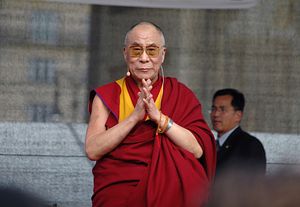Earlier this month, reports emerged that South Africa denied a visa to the Dalai Lama, preventing him from attending the World Summit of Nobel Peace Laureates to be held in Cape Town from October 13 to 15. As the summit draws closer, Nobel Laureates and Tibetan activists are leading a campaign to pressure the South African government to reverse course.
The South African Department of International Relations and Cooperation (DIRC) denied that it had refused a visa to the Dalai Lama, saying instead that he had cancelled his application. The DIRC said in a statement that when the Dalai Lama decided to cancel his trip, “the South African High Commission in New Delhi was still processing the visa application in line with due process.”
Cape Town’s mayor, Patricia De Lille, called this “disingenuous” in a written statement. “The fact is that on the basis of the National Government’s telephonic contact with the office of the Dalai Lama, it was clear that his application was going to be refused and His Holiness withdrew his application to avoid any further embarrassment,” De Lille wrote. She called the decision to deny the Dalai Lama a visa “appalling.” “It is indeed a dark day for South Africa when the ideals for which Nelson Mandela and so many others fought are sold to the highest bidder,” De Lille said.
De Lille and others accuse the South African government of giving in to pressure from China on the Dalai Lama issue. Beijing considers the Dalai Lama an advocate for Tibetan separatism and a political, not a religious, figure. Accordingly, Chinese authorities place heavy pressure on other governments not to provide the Dalai Lama a platform. In response to the current visa situation, spokesman from China’s Foreign Ministry commended “the firm support that the government of South Africa has shown to China on issues regarding China’s sovereignty and territorial integrity.” He added that China believes “South Africa will stick with their right stance on these matters.”
A letter from 14 Nobel Peace Laureates urged the South African government to reconsider its decision. The letter said:
“We understand the sensitivities involved – but would like to point out that His Holiness, the Dalai Lama, no longer holds any political office and would participate in the Summit solely in his capacity as a globally respected spiritual leader. We are deeply concerned about the damage that will be done to South Africa’s international image by a refusal – or failure – to grant him a visa yet again.”
The letter, sent to South African President Jacob Zuma, was signed by Amnesty International, Bishop Carlos F. Ximenes Belo, Dr. Shirin Ebadi, Prof. Muhammad Yunus, and Lord David Trimble, among others. The laureates urged Zuma “to unconditionally guarantee a visa to His Holiness, the Dalai Lama.”
Four of the signatories — Jody Williams, Shirin Ebadi, Leymah Gbowee, and the International Campaign to Ban Landmines — decided this week to boycott the summit in protest. A press release from the Tibetan National Congress tied that announcement to its “global campaign urging the Nobel Laureates to either boycott or relocate the summit to a venue more compatible with the Nobel Peace Prize’s ideals of open and inclusive dialogue.” TNC is a political party seeking “the ultimate goal of restoring a sovereign and independent Tibetan nation state.”
In the press release, TNC President Jigme Ugen said, “The world needs this summit and no authoritarian government should be allowed to control it by censoring which voices gets heard.” Ugen added, “We also believe that the summit will be irreparably tainted by accepting and implicitly endorsing the bullying tactics of the Chinese government.” TNC also released a petition asking Nobel Peace Laureates to boycott the summit.
According to Mayor De Lille, the foundations of South Africa’s own four Nobel Peace laureates (Nelson Mandela, Albert Luthuli, Desmond Tutu, and FW de Klerk) also planned to write letters to President Zuma asking him to grant the Dalai Lama a visa. A representative from the Mandela Foundation told The Diplomat that the foundation was “still gathering information to understand his [the Dalai Lama’s] retraction” of the visa application. A September 4 statement from the Mandela Foundation noted the DIRC’s insistence that the Dalai Lama’s visa was being processed normally. “We look forward to being in attendance at the 14th World Summit of Nobel Peace Laureates in Cape Town together with His Holiness and other laureates,” the statement read. The Tutu Foundation, and De Klerk Foundation did not immediately respond to requests for comment.
Even if the summit continues as planned, attendees will not ignore the controversy. De Lille promised an alteration to the summit program “to ensure that the Nobel Peace Laureates can make a powerful symbolic protest of the Dalai Lama’s treatment.”
Ironically, it might have been better for China if the South African government had simply granted the Dalai Lama a visa, thus avoiding both an ugly controversy and waves of publicity for the Dalai Lama and Tibetan activists. The timing is particularly bad as China recently sentenced Uyghur professor Ilham Tohti to life in prison on charges of separatism. Some observers, including Chinese writer Wang Lixiong, have compared Tohti to South African national hero Nelson Mandela (a comparison Chinese media and officials have fiercely rejected). That only provides more fuel for human rights advocates who argue that China’s government is fundamentally at odds with the values the World Summit of Nobel Peace Laureates seeks to promote — and that the South African government is betraying Mandela’s own values by giving in to Chinese pressure.
This piece has been updated with a statement from the Mandela Foundation

































